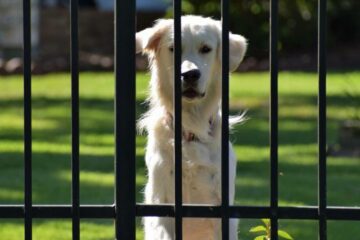Dog With Chickens: Friendly Breeds + Train to Protect!
Can you have a dog with chickens around without there being havoc? Yes, you sure can! And in this article, we’ll show you how. We’ll start by teaching you how to train dogs protecting chickens, how to train dogs to leave chickens alone, and how to stop dogs barking at chickens.
Next, we’ll cover a tough but necessary subject: if a dog kills a chicken, will it kill again? Moving on, we’ll tell you what makes dogs good with chickens by explaining the best breeds by size (large, medium, small), demeanor, and overall protectiveness. If your dogs and chickens haven’t met, we’ll teach you how to introduce them safely.
Finally, we’ll cover if a dog eating chicken poop will make them sick, and is chicken feed bad for dogs. Keep reading!
Dog With Chickens: Teaching Safe Interactions

The interactions of a dog with chickens can be safe using patience and consistent training. Dogs should be taught to protect chickens, leave them alone, stop barking at them, and drop anything they shouldn’t have. The key lies in curbing the dog’s predatory instincts and teaching them to view chickens as part of the family.
Dogs Protecting Chickens: How to Train
To train your dog to protect chickens, introduce them to the flock gradually. Use a leash to control your dog’s movements. Reward your dog for calm behavior around the chickens and correct them if they show signs of aggression or over-excitement.
Use commands such as “watch” to get your dog’s attention and “easy” to encourage calm behavior. Over time, your dog will associate chickens with a relaxed state and protectiveness rather than predation.
Train a Dog to Leave Chickens Alone
To train a dog to leave chickens alone, you can use the “stay” command. Start in a quiet room with few distractions. Tell your dog to “stay” and then move a few steps away. If your dog remains in place, give them a reward.
Gradually increase the distance between you and your dog over time. Once your dog is reliable with the “stay” command in a low-distraction environment, you can begin practicing around the chickens.
How to Stop Dog Barking at Chickens
To stop your dog from barking at chickens, you can use the “quiet” command. Start by saying “quiet” when your dog barks. When your dog stops barking, reward them with a treat or praise. Be consistent with the training, and eventually, your dog will associate the command with stopping barking.
Teaching Your Dog the “Drop It” Command
A useful command to teach your dog, especially around chickens, is “drop it.” This can help if your dog grabs a chicken or picks up something it shouldn’t. Start with a toy in a controlled environment.
When your dog has the toy in their mouth, say “drop it,” then use a treat to entice them to let go of the toy. When they do, praise them and give them the treat. Repeat this process until your dog consistently follows the “drop it” command, then try it around the chickens.
Address Underlying Issues
If your dog continues struggling to behave with your chickens, then you likely have underlying behavioral issues (prey drive, anxiety, overexcitement, etc.) that are driving all of this continued misbehavior. And until you address those, any positive changes you may see are only going to be temporary.
“Well, how do I make these changes last?”
By getting your dog to truly choose to follow your direction, that’s how. I tried many times to write out how you can do that before deciding it made more sense to just link you to the free video series that explains it better than I’d ever be able to.
The series is by a man named Dan who is one of the world’s leading dog obedience trainers. In it, he teaches you how to put an end to things like when your dog doesn’t behave properly around the chickens and all other misbehavior using his fast and easy-to-follow methods.
In the first video, Dan will reveal to you why the two most common methods of dog training only doom you to failure. You can watch the video now by clicking here. Follow the proven system he’ll show you in his series and you’ll never have to spend another second worrying about your dog’s behavior around your chickens ever again!
If a Dog Kills a Chicken, Will It Kill Again?

If a dog kills a chicken, it may do so again if given the opportunity. However, this is not guaranteed. Much depends on the individual dog’s temperament, training, and the circumstances that led to the initial incident. Effective training and management can help to prevent future incidents. It’s important that you address the issue immediately to mitigate the risk of it happening again.
Understanding the Predatory Drive in Dogs
Dogs are descendants of wolves, and thus have an innate predatory drive. This drive can be triggered by small, fast-moving creatures like chickens. The sight, sound, or movement of a chicken can cause a dog to act on this instinct. It’s not necessarily a sign of a violent or ‘bad’ dog but rather an instinctual response.
Dog Kills a Chicken: How to Train Them Now
If your dog kills a chicken, you should immediately begin using training to address the issue. Training methods such as impulse control exercises, establishing boundaries, and positive reinforcement for appropriate behavior can be highly effective. We explain how to do these commands in the first section.
Preventing Future Incidents
To prevent future incidents, make sure your dog is always supervised around chickens and that chickens are kept securely, out of your dog’s reach when you’re not there. It’s also important to provide your dog with plenty of physical and mental stimulation, as boredom can contribute to unwanted behaviors. If needed, re-evaluate your backyard setup, considering separate spaces for your chickens and dog.
Will My Dog Kill Chickens Again?
If a dog kills a chicken, it might kill again under similar circumstances. However, it’s not an inevitability. By understanding the situation, undertaking appropriate training, and managing your dog’s environment, you can significantly reduce the risk of further incidents. Every dog is an individual and with the right approach, a peaceful co-existence is achievable.
Learn how to make your home safe for all your animals by going back to the first section now.
Dogs Good With Chickens: Breeds & Demeanor

While not every dog breed is suitable for cohabitation with chickens, several breeds, divided into medium, small, and large categories, are known for their compatibility. Good dog-chicken relationships depend on the breed, individual temperament, and training. When selecting the best dog to protect chickens, personal needs, and living conditions also matter.
Medium Dogs Good With Chickens
- English Springer Spaniel: Known for their gentle nature and good with livestock.
- Border Collie: Intelligent and trainable, often used as herding dogs.
- Australian Shepherd: Another intelligent breed known for its herding skills.
- Brittany Spaniel: These dogs are known for their soft mouth and respect towards other animals.
- Bearded Collie: With their herding instincts, they can be trained to look after chickens.
Small Dogs Good With Chickens
- Basset Hound: Despite their hunting instincts, they’re generally friendly with chickens.
- Shetland Sheepdog: Originally bred for herding, they can be trained to live with chickens.
- Cavalier King Charles Spaniel: Their gentle and friendly nature makes them good companions for chickens.
- Cocker Spaniel: They are generally friendly with other animals, including chickens.
- Papillon: This intelligent breed can be trained to cohabitate well with chickens.
Large Dogs Good With Chickens
- Maremma Sheepdog: Italian breed known for guarding livestock, including chickens.
- Great Pyrenees: Protective and gentle, excellent for guarding chickens.
- Bernese Mountain Dog: Generally good with other animals if trained from a young age.
- Akbash Dog: A Turkish breed used for centuries to guard livestock, they can be good protectors for chickens.
- Komondor: This Hungarian livestock guardian breed is well-suited to protecting chickens.
Demeanor of Dogs Good With Chickens
The temperament of a dog that’s good with chickens is generally calm, patient, and non-predatory. These dogs should be non-aggressive, yet protective when necessary. They must respect chickens as members of the family, not as prey. The demeanor of a good dog for chickens often reflects a well-socialized, trained, and obedient character.
To teach your dog how to be good with chickens by learning to obey your commands around them, go back to the first section now.
Best Dog to Protect Chickens
The best dog to protect chickens depends on your specific needs, living conditions, and what you’re looking for in a dog. Consider factors such as the size of your property, the number of chickens you have, your ability to train and care for the dog, and the dog’s breed and temperament.
Remember that even within breeds known for being good with chickens, individual dogs may vary, and training plays a significant role in ensuring harmony between your dog and your chickens. Learn what else you need to know in the first section.
Dogs and Chickens: How to Introduce
Introducing dogs and chickens can be a delicate process due to dogs’ predatory instincts and chickens’ skittish nature. A gradual, patient, and carefully controlled introduction process is the key to success.
- Use a Barrier: Initially, keep a physical barrier (like a sturdy wire fence) between your dogs and chickens. This allows them to see, smell, and get used to each other without the risk of any harm.
- Leash Training: When your dog is around the chickens, keep them on a leash. This gives you control and prevents any potential chase or attack. Train your dog to sit and stay calmly in the presence of the chickens.
- Gradual Exposure: Slowly increase the time your dog spends around the chickens. Start with short, supervised sessions and gradually lengthen them as your dog becomes more comfortable and behaves appropriately.
- Positive Reinforcement: Use treats and praises to reward your dog for calm behavior around the chickens. This reinforces the idea that good things happen when they behave well around the birds. More on this in the first section.
- Monitor Interactions: Never leave your dog unsupervised with the chickens until you’re sure they can coexist peacefully. This might take several weeks or even months, depending on your dog’s temperament and the chickens’ reactions.
Introducing dogs and chickens is a gradual process that involves careful monitoring and positive reinforcement. Patience and consistency are key factors in ensuring a peaceful coexistence between your canine and avian pets. We explain more you should know in the first section.
You should get this taken care of right away as it will also mean easier interactions between your dog and other animals. That means no more worrying about what would happen if there were encounters between your dog and horses, dog and goats, dog and pigs, dog and sheep, dog and geese, or dog and ducks.
Dog Eating Chicken Poop
A dog eating chicken poop is not uncommon due to their curious nature and taste preferences, but it’s certainly not a healthy habit. While the act is generally not lethal, it can lead to health problems due to potential pathogens in chicken feces. To ensure your pet’s safety, you should discourage this behavior and maintain a clean environment.
Can Chicken Poop Make a Dog Sick?
Chicken poop can make a dog sick. Chicken feces may contain harmful bacteria and parasites such as Salmonella, E. coli, and worms. When ingested, these can cause symptoms ranging from gastrointestinal upset, including diarrhea and vomiting, to more serious conditions like bacterial infections and parasitic infestations. It’s important to monitor your dog’s health and consult a vet if your pet shows signs of illness after consuming chicken poop.
Can Dogs Eat Chicken Poop?
While dogs can eat chicken poop (meaning that it’s physically possible), it’s highly discouraged due to the health risks from parasites and harmful bacteria. Despite the dog’s natural scavenging behavior and the potential attraction to chicken poop’s strong smell, it’s important to train your dog to avoid it. Positive reinforcement training methods can be effective in curbing this behavior. Learn these in the first section.
Puppy Eating Chicken Poop
Puppies are particularly susceptible to health risks from eating chicken poop due to their developing immune systems. Similar to adult dogs, they might be attracted to the scent and taste of chicken feces but may be more prone to gastrointestinal upset and potential bacterial or parasitic infections.
It’s important that you supervise your puppies when they’re in an environment with chickens and discourage any attempts to eat chicken feces. Also, ensure your puppy is up to date with deworming and vaccinations to protect against possible diseases.
Is Chicken Feed Bad for Dogs?
While chicken feed isn’t toxic to dogs, it’s definitely not suitable for them either. Chicken feed is formulated for chickens, not canines, and lacks the necessary nutrients for a balanced dog diet. Additionally, it can lead to digestive issues if consumed in large quantities. Always feed your dog a balanced diet specifically designed for their species, size, and age.
My Dog Ate Chicken Feed
If your dog ate chicken feed and it was only a small amount, there’s usually no need to panic. Most dogs will not experience severe health issues from incidental consumption. However, eating large quantities of chicken feed could lead to digestive upset, including symptoms such as bloating, gas, diarrhea, or constipation.
If your dog has eaten a significant amount of chicken feed or is showing signs of discomfort or illness, it’s important to contact your veterinarian.
Can My Dog Eat Chicken Feed?
Even though a dog can physically consume chicken feed, it’s not recommended as a dietary choice. The nutritional requirements of dogs and chickens are vastly different. Chicken feed doesn’t contain the correct balance of proteins, fats, and carbohydrates needed for dogs, and lacks many of the specific nutrients dogs require for optimal health.
Regular consumption of chicken feed could lead to malnutrition and other health issues in dogs. Always provide your dog with high-quality, dog-specific food.
How to Stop Dog Eating Chicken Feed
To stop your dog eating chicken feed, make sure to store the feed in a secure, inaccessible location. If your dogs and chickens share a yard, feed your chickens in a separate, fenced-off area or in a way that the dogs cannot access the feed.
Training commands like “leave it” can also help teach your dog to avoid the chicken feed. Always monitor your dog when they’re in close proximity to chicken feed. Learn more commands your dog should know in the first section.
I’m sure you’re ready to not worry about your dog with chickens anymore, so I’ll let you get started on things. Good luck with all of this, and thanks for reading our article “Dog with Chickens: Friendly Breeds + Training Safety!”





